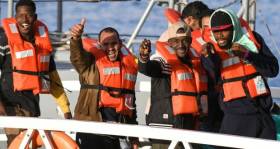Displaying items by tag: Migrants
Migrants Found ‘Hiding’ on Cargo Ship at Port of Waterford
A total of eight migrants discovered “hiding” on board a cargo ship at a port near Waterford city on Wednesday are likely to be sent back to France in the coming days.
The discovery, reports The Irish Times, was made by the crew of a “bulk cargo ship” that was travelling from St Nazaire in France to Belview Port. Three men fled the ship after being discovered, but were apprehended by gardaí a short time later.
A garda spokesman said the eight migrants, all believed to be adult males from Albania, were found to be in good health.
“Gardaí in Waterford were alerted to an incident today, Wednesday 4th December 2019, in Belview, Co Waterford where eight males were discovered by the crew in hiding on a bulk cargo ship travelling from France to Ireland,” the spokesman said in a statement.
“Garda immigration officers attached to Waterford Garda station are currently dealing with the males and they will be processed under the immigration law.”
The eight men are are believed to have stowed away on board the bulk carrier at St Nazaire before it sailed to Belview Port, where it arrived at around 9am on Wednesday. Port officials alerted gardaí to the presence of the stowaways.
For much more from the newspaper's coverage click here.
Irish Linked Migrant Offshore Aid Station Delivers Supplies to Stranded Alan Kurdi Rescue Ship
The Mediterranean migrant rescue charity founded by a Malta-based couple with Irish links has launched a relief mission to assist a German rescue ship which has been stranded for over six days in international waters and refused safe harbour writes Lorna Siggins.
The Migrant Offshore Aid Station (MOAS) says it delivered supplies to the Alan Kurdi rescue ship run by the German non-governmental organisation, Sea Eye.
The German ship, named after three-year-old Syrian Kurdish refuge Alan Kurdi who was washed ashore on a Turkish beach in September 2015, had appealed for assistance after ports refused entry.
"The German rescue ship has been stranded for over six days in international waters"
The ship stated it was short of food, water, medicine and other supplies. It reported 64 migrants on board, mainly women and children, rescued by it off the Libyan coast on April 3rd. A young woman on board the ship requiring urgent medical attention was evacuated to Malta on April 9th.
Italian and Maltese authorities have so far refused the ship safe harbour.
MOAS, which suspended its own Mediterranean rescue operations in 2017, was founded in 2014 by millionaire Christopher Catambrone, an American of Irish and Italian descent, and his Italian wife, Regina, in 2014. Mr Catambrone had made his living from insurance in conflict zones, such as Iran and Afghanistan.
At the time, there was much international outcry over the deaths of migrants trying to make the Mediterranean crossing to seek refuge, with over 400 drowning in a boat capsized off the Italian island of Lampedusa in October 2013.
Ireland was recently informed that its involvement in the current EU operation will change, with the downgrading of Operation Sophia.
The Naval Service ship LE Eithne will not be deployed to the Mediterranean as had been anticipated later this month.
Ireland initially became involved in migrant rescue in 2015 in a bilateral agreement with Italy and switched to the EU operation, focused more on surveillance and interdiction of people smugglers off Libya, in July 2017.
MOAS said it felt “compelled to act” this week to assist the 63 migrants still on board the Alan Kurdi and its crew.
“Most of those onboard have already experienced unimaginable atrocities in Libya and we are therefore deeply saddened that the ship has been stranded for so long, especially when those onboard include an infant and a young child who have been facing adverse weather conditions,” MOAS said in a statement today.
“MOAS refuses to ignore the plight and suffering of those on Europe,s doorstep,” it said, and recent escalating violence in Libya only “enhances the need for the creation of safe and legal route s for vulnerable people in desperate need of protection”, it said.
MOAS says it rescued over 38,000 people in the central Mediterranean between August 2014, and August 2017.
It says it suspended operations when “the intensification of Libyan sea patrols meant our organisation risked becoming complicit in the practice of intercepting migrants and returning them to Libya to face grievous human rights violations”.
It says that while there has been a decrease in arrivals in Europe over the past four years, the death rate for Mediterranean crossings has increased from one death per 269 arrivals in 2015 to one death per 51 arrivals last year.
Medical charity Medecins Sans Frontieres also ceased rescue in the Mediterranean last December. It withdrew its ship Aquarius after what it claimed to have been a “sustained smear campaign” led by the Italian government.
MOAS director Regina Catrambone said: “MOAS is an international NGO that is focused on mitigating human suffering. Our aim is to serve communities in crisis, such as those onboard the Alan Kurdi ship by providing immediate aid and assistance. We are an apolitical organisation motivated only to help those in need”.MOAS now hopes that the international community will focus on showing solidarity and compassion in their response to this search and vessel, and allow those onboard safe harbour in Europe, she noted.
Agreement From Ireland Leads to Taking Five Unaccompanied Minors Stranded in Malta
#NewsUpdate - An agreement by the Government is set to welcome five unaccompanied minors to Ireland out of a group of migrants who were rescued in recent weeks from the Mediterranean Sea, reports The Irish Times.
Minister for Justice and Equality Charlie Flanagan, and Minister of State for Equality, Immigration and Integration David Stanton said they were pleased to announce the move - part of an agreement between eight European countries to assist almost 300 migrants who have been brought to Malta since the start of December - as “as a gesture of solidarity and humanitarian assistance”.
Speaking after discussions between Irish officials, the Maltese authorities and and the European Commission, Mr Flanagan said: “These children have been rescued from the Mediterranean Sea in humanitarian search and rescue missions and have been through a terrible ordeal.
For more on the story can be read here.


























































